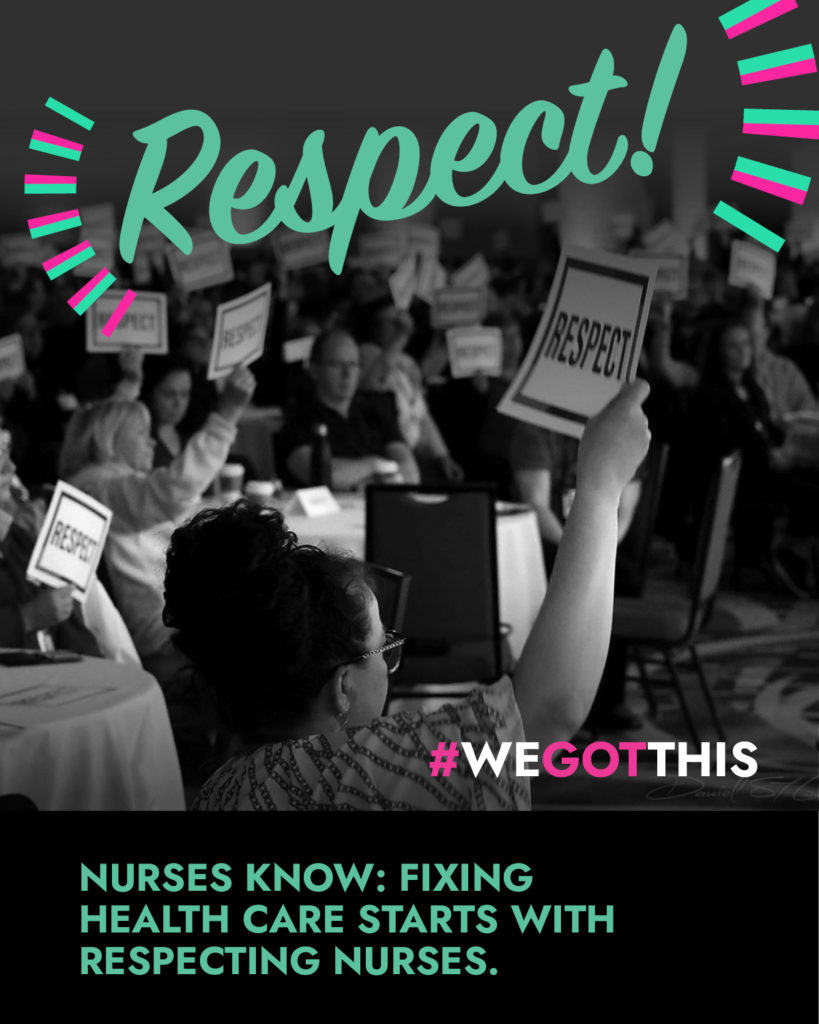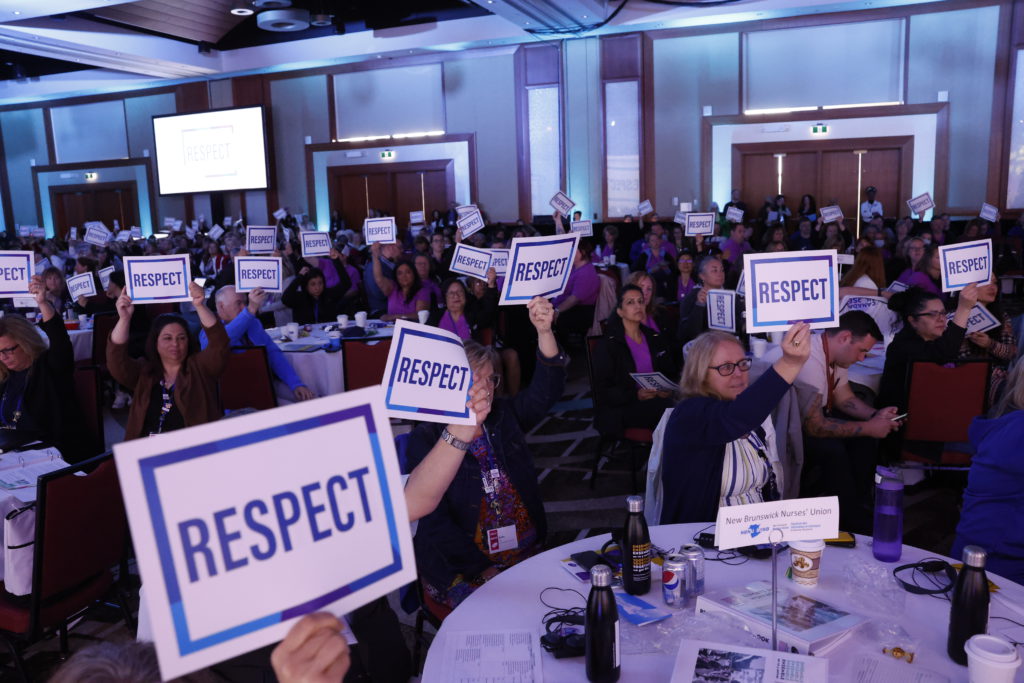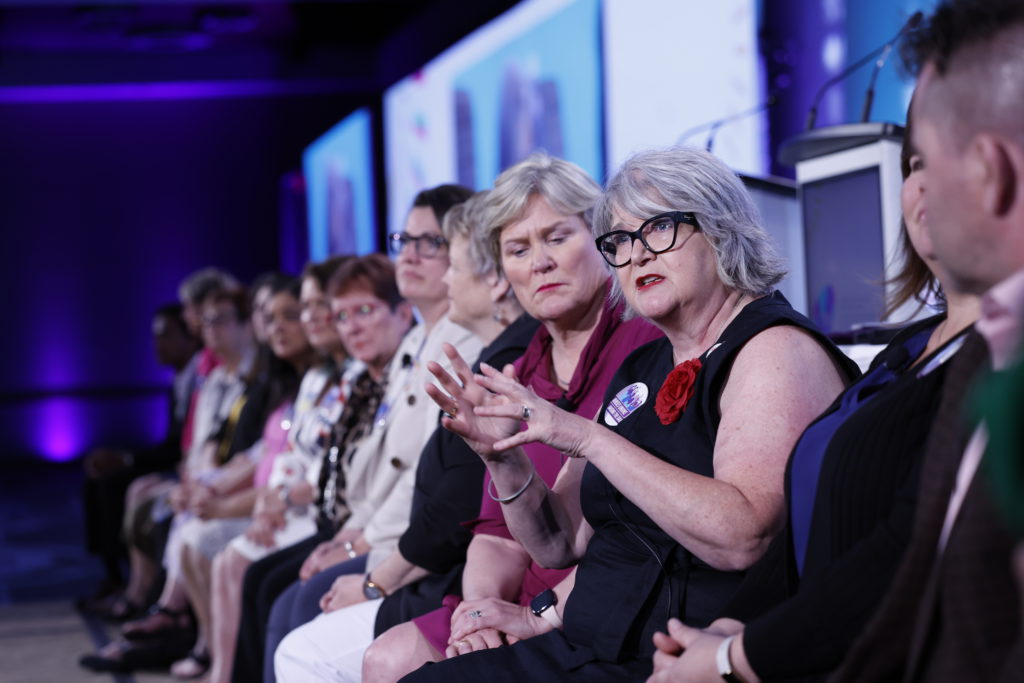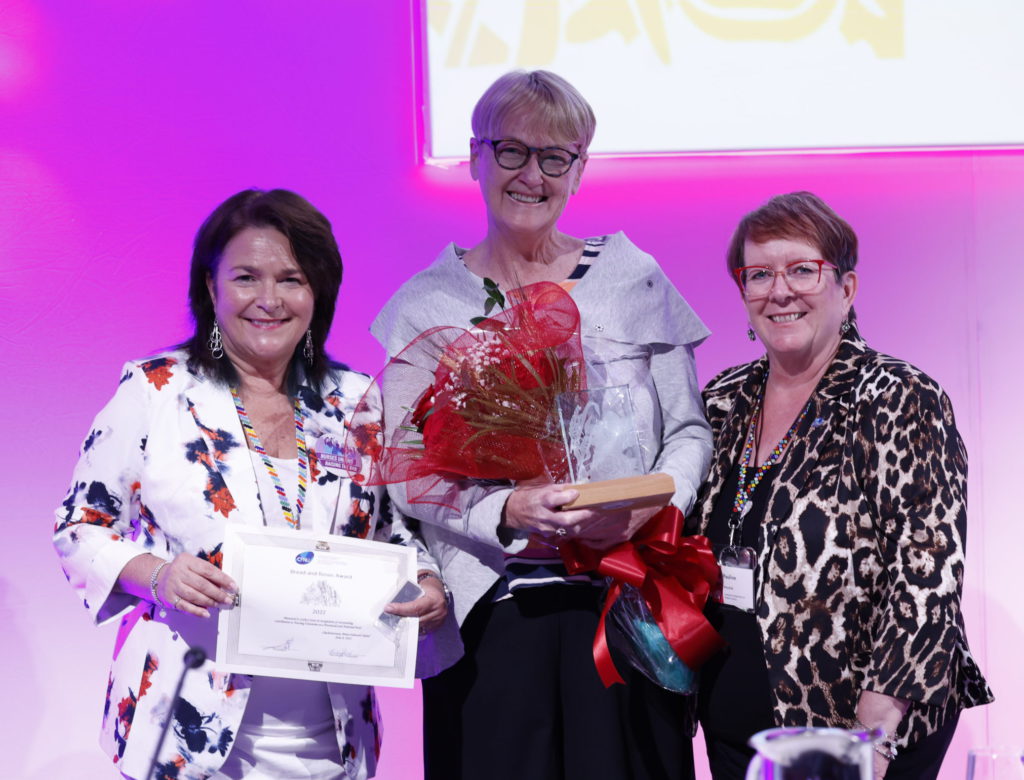

Amidst a chorus of thunderous applause, CFNU President Linda Silas stepped onto the stage and declared to over 1,000 nurses: “No more making nice!”
In a room filled with nurses familiar with burnout and challenging working conditions, Silas acknowledged their resilience and expressed heartfelt gratitude for their unwavering dedication.
Pride and purpose permeated the atmosphere as Silas told nurses their well-being would always be protected and their voices represented. She assured nurses that the CFNU is “turning up the dial”, and made clear that their unions would never be silent on the issues that mattered to them.
Nurses were reminded of what we achieve when we raise our voices and work together in solidarity: advancements towards implementing nurse-patient ratios in British Columbia, the crucial amendment to the criminal code protecting nurses from workplace violence, and the appointment of Canada’s Chief Nursing Officer.
Over the last two years, the CFNU has taken nurses’ concerns to the federal level, bringing the challenges facing frontline nurses and solutions to address them directly to the Prime Minister, health ministers and premiers.
The CFNU is also committed to producing high-quality research that sheds light on top nursing issues. On the heels of a successful report outlining the magnitude of the nursing crisis and the known solutions to address it, the organization is turning its focus to studying safe working hours for nurses. Silas pointed out that truckers and pilots have limits to the hours they can safely work, but no such legislation exists for nurses’ work with their patients.
“We are really rising the bar,” said Silas. “Building the evidence on the hours of work . . . making sure that the lives of our patients are as important as the lives of air passengers, that the lives of nurses are as important as the lives of pilots.”
Nurses know: fixing health care starts with respecting nurses. As Silas closed her address, this sentiment echoed throughout the room with nurses chanting for respect – a resounding demand for change.

In contrast to the upbeat and empowering atmosphere at CFNU biennial convention, all is not well in Canadian health care. But as shown during the open forum of the National Executive Board, Canada’s nursing leaders are engaged and listening, and Canada’s nurses are ready to act.
The challenges members raised at the microphones during the forum are daunting.
Violence in the workplace and a lack of support from law enforcement. The erosion of universal health care by for-profit clinics and agency nursing. The burden on nursing students facing mounting student debt and an ancient curriculum. A career plagued by short-staffing and mandatory overtime.
And yet, each issue was met with calm confidence and firm resolve from leadership: these are Canada’s nursing unions, and they will not be discouraged.
“Don’t cry, fight back!” stated CFNU President Linda Silas, to encourage nurses to fight hard to make a difference.
The union presidents also shared stories of their triumphs in the workplace, including nurse-to-patient ratios being legislated in BC.
“These are exciting times for our nurses to show everyone that this is achievable,” said BCNU President Aman Grewal.
In Alberta, where the recent provincial election was narrowly won by the conservative party, strong lights of hope still shine. UNA Vice-President Danielle Larivee reminded the crowd that a nurse won her seat for the NDP party, defeating the incumbent UPC member – a former health minister – by only 25 votes.
“If you don’t like what’s going on, you have the power of the ballot,” said SUN President Tracy Zambory, while encouraging members to “dig down deep, because if we don’t do anything, nothing’s going to change.”
Nationwide privatization is another issue NEB members suggested Canada’s nurses consider when voting. And – when possible – to speak candidly with their friends and family about health care issues that matter.
“When those candidates knock on your door, it is your job to hold them accountable,” said MNU President Darlene Jackson. “We hired them at the ballot box. We can fire them at the ballot box.”
Using elections at all levels to advance health care is a tool everyone has access to, the power to defend a system that is vital to all Canadians: universal health care.
“Profit doesn’t care,” said Pauline Worsfold, CFNU Secretary-Treasurer. “Profit doesn’t care if you’re sick. But nurses care.”

A seniors’ advocate, a street nurse and two prominent nursing union activists were honored yesterday with the prestigious Bread & Roses Awards.
This year’s Bread & Roses Awards were presented to: a street nurse, educator, author, filmmaker and homeless rights activist Cathy Crowe; seniors’ and women’s rights champion Cecile Cassista; Registered Nurses’ Union of Newfoundland and Labrador President Yvette Coffey; and Manitoba Nurses Union President Darlene Jackson.
“In their work or in their communities, these awards celebrate outstanding activism by nurses,” said CFNU President Linda Silas.
Silas has described Crowe, a recipient of the Order of Canada, as a powerful voice for the dispossessed and the nursing profession.
“This award represents the thanks of Canada’s nurses for her tireless work to make our country a better place for everyone,” she said.
She praised Cassista, founder and executive director of the Coalition for Seniors’ and Nursing Home Residents’ Rights and a recipient of the Order of New Brunswick, for her efforts ensuring “all seniors have access to care by registered nurses and licensed practical nurses, and not by underqualified employees whose work is not regulated.”
And she lauded the leaders of the two affiliate unions for their fierce defense of public health care and their advocacy for members during the darkest hours of the pandemic.
“Yvette led RNUNL through two of the most tumultuous years in the history of Canada’s nursing profession and did so with confidence and grace,” Silas said. “Darlene was front and centre advocating for nurses throughout the pandemic, showing the public the reality of the crisis that was faced by nurses.”
CFNU Bread & Roses Awards are presented each year for outstanding contributions to health care policy and decision-making, and for raising public awareness of nursing issues and patient advocacy.
The Bread & Roses Award is named in honour of the pioneers in the fight for women’s suffrage and women’s workplace rights and dignity. The phrase is often associated with a textile workers’ strike in Lawrence, Massachusetts, in 1912, in which the strikers demanded: “Give us bread, but give us roses too.”